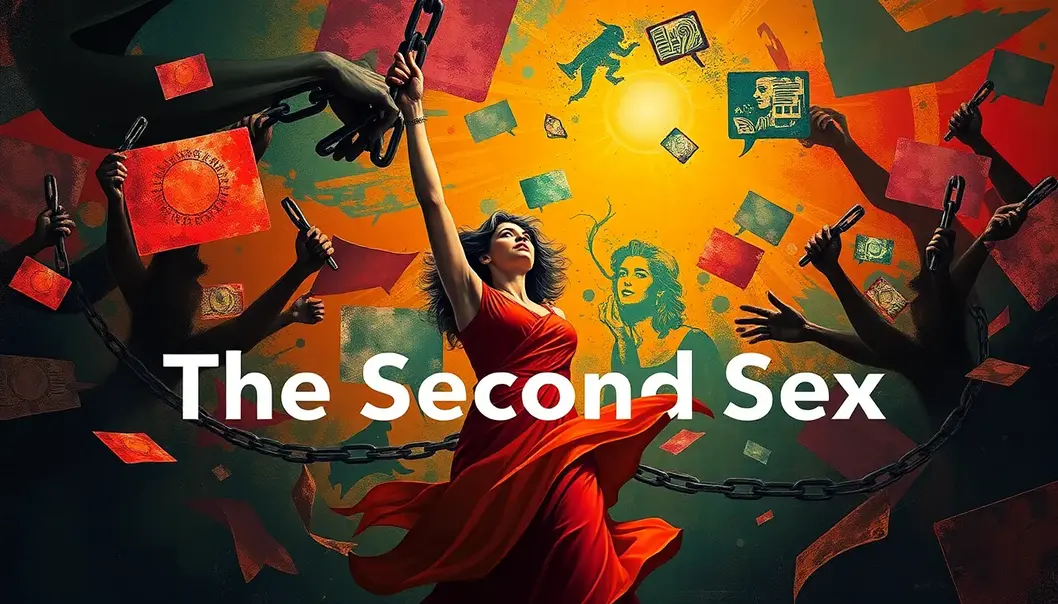Books have always served as mirrors and lanterns, reflecting societal norms or lighting the way toward new paradigms. In the realm of societal transformation, certain texts have left indelible marks, prompting readers to rethink entrenched views. These books challenge the status quo, encouraging introspection and fostering change. Their narratives pervade beyond the pages, becoming catalysts for discussion and activism. As busy professionals strive to stay informed and insightful amidst demanding schedules, understanding these influential works can provide both a refuge of creativity and a measuring stick for progress. Here are two pivotal books whose impact continues to resonate with thinkers and doers alike.
Breaking the Chains: ‘1984’ by George Orwell

George Orwell’s ‘1984’ persists as a critical lens through which we evaluate modern society’s understanding of privacy, government control, and societal conformity. Written in the shadow of totalitarian regimes that marked the early 20th century, Orwell’s dystopian vision serves as an enduring cautionary tale.
Set in a world of pervasive surveillance and authoritarian governance, Orwell paints a stark picture of a society where individuality is smothered under the weight of omnipotent state power. The protagonist, Winston Smith, navigates a life governed by the Party’s doctrine, encapsulating the terrifying possibility of a future where privacy is obliterated. This exploration of constant surveillance mirrors current societal concerns, where the boundaries between personal freedom and state security blur.
In an era where technological advancements offer unprecedented access to personal data, ‘1984’ sharply critiques how easily privacy can be sacrificed in the name of safety and order. The novel’s depiction of telescreens and the Thought Police eerily prefigures today’s digital footprint and the ubiquitous monitoring that can accompany it. As we grapple with these realities, Orwell’s work reminds us of the ethical responsibilities that accompany power.
Furthermore, the novel’s portrayal of language manipulation through ‘Newspeak’ challenges us to consider the power of language in shaping thought and controlling populations. Simplified vocabulary limits dissent and complex thinking, reflecting societal tendencies towards reductionist discourse. This serves as a stark warning about the consequences of ignoring the development of critical thought and open dialogue.
Orwell wrote ‘1984’ in a period fraught with the rise of oppressive regimes, using his narrative to critique the mechanisms of control employed by such governments. His insights are applicable to contemporary issues of censorship, propaganda, and the delicate balance leaders must maintain between ambition and ethical integrity. Today’s decision-makers are tasked with navigating these complexities while safeguarding democratic principles and individual freedoms.
The implications for leaders are profound. Orwell’s work encourages vigilance and underscores the need for transparency and accountability in governance. It challenges those in power to act conscientiously, ensuring that the structures they build do not erode the freedoms they are meant to protect. As we move forward, ‘1984’ continues to be an essential tool for reflecting on the impact of unchecked ambition and the importance of steadfast ethical responsibility in leading society towards a future where individuality thrives alongside collective security.
From Silence to Speech: ‘The Second Sex’ by Simone de Beauvoir

Simone de Beauvoir’s ‘The Second Sex’ serves as a monumental intervention in feminist thought and the discourse on gender roles. Published in 1949, this expansive work challenged the prevailing notions of femininity and advocated for a radical redefinition of women’s identity. Beauvoir’s rigorous analysis of women’s oppression laid the groundwork for the feminist movement, acting as a catalyst for change in how gender was perceived across societies.
During the late 1940s, the socio-political climate was one in which women had begun to gain ground in the fight for rights. Yet, they were still largely confined to domestic roles and defined by their relationships to men. Through meticulous research and philosophical inquiry, Beauvoir sought to unveil the roots of this inequality, famously declaring that “one is not born, but rather becomes, a woman.” This challenged the deterministic views of gender and encouraged women to break free from the shackles of societal expectations.
Beauvoir’s work was instrumental in shifting conversations about gender from biological determinism to social constructs. This perspective not only empowered women to pursue their interests beyond traditional roles but also inspired liberation movements to tackle patriarchal structures. ‘The Second Sex’ resonated with the burgeoning feminist movements of the 1960s and 70s, providing intellectual foundation and a rallying cry for equality.
Today, ‘The Second Sex’ remains as relevant as ever in discussions of gender equality. Its insights continue to influence contemporary feminist theory and activism, urging societies to persist in dismantling gender biases. For professionals aiming to cultivate inclusive workplaces, Beauvoir’s examination of gender roles offers critical guidance. Understanding the pervasive nature of gendered expectations allows leaders to foster environments that promote equity and diversity.
Moreover, the book’s timeless appeal extends beyond feminist circles, challenging all individuals to reflect on the societal norms that define human potential and freedom. By dissecting the historical subjugation of women, Beauvoir equips readers with the intellectual tools to question inequality and champion changes that are essential for collective social progress.
Incorporating the lessons from ‘The Second Sex’ can empower professionals to create workplaces that respect and celebrate differences. By doing so, they not only promote equitable futures but also contribute to the larger movement for gender equality worldwide. For those interested in delving further into progressive and inclusive paradigms, exploring resources that aid in understanding these dynamics is crucial. Explore more thought-provoking strategies on societal inclusivity and rights.
Final words
Books have a profound ability to shape societal norms and provoke thought. ‘1984’ warns of unchecked authority, while ‘The Second Sex’ advocates for gender parity. Both works remain relevant, urging professionals to reflect on ethical practices and equality. As we look to the future, these texts remind us to challenge conventions and seek reforms. Their enduring relevance offers wisdom to those navigating complex societal landscapes today.
Embrace transformative insights with our curated reading list. Discover more books that challenge perspectives!
Learn more: https://www.booknook.com/read-more
About us
BookNook offers a curated library of influential reads that challenge the norm and inspire progressive thinking. Join our community to access critical analyses, author interviews, and exclusive content tailored for professionals. Benefit from our expertly selected book recommendations to nurture your intellectual growth and stay ahead in your industry.

